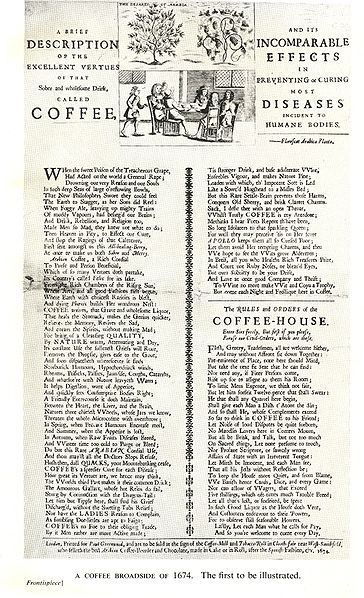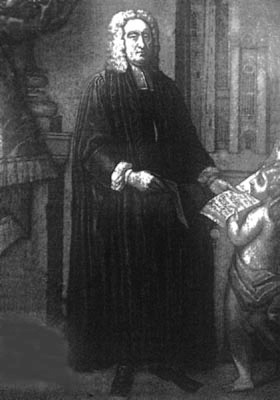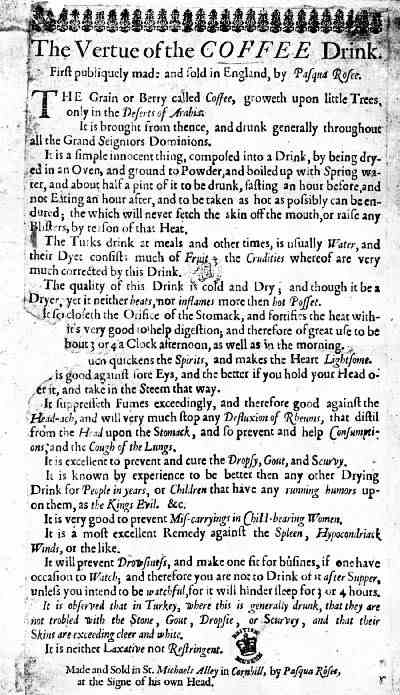|
Will's Coffee House
Will's Coffee House was one of the foremost coffeehouses in England in the decades after the Restoration. It was situated in Russell Street in London, at the northwest corner of Bow Street, between the City and Westminster. According to the ''Methuen Drama Dictionary of the Theatre'', it was also known as the Rose Tavern, the Russell Street Coffee House, and the Wits' Coffee House. It was founded by Will Urwin. Patrons Will's Coffee House was the home of the Wits, centring on the figure of John Dryden. With the departure of John Dennis, William Wycherley complained in a well-known letter, "nor is Wills the Wits Coffee-House any more, since you left it, whose Society for want of yours is grown as Melancholly, that is as dull as when you left 'em a Nights, to their own Mother-Wit, their Puns, Couplets, or Quibbles...." "This place is much altered since Mr Dryden frequented it," recalled Richard Steele in '' The Tatler'' afterwards; "where you used to see songs, epigrams, and sati ... [...More Info...] [...Related Items...] OR: [Wikipedia] [Google] [Baidu] |
English Coffeehouses In The 17th And 18th Centuries
In 17th- and 18th-century England, coffeehouses served as public social places where men would meet for conversation and commerce. For the price of a penny, customers purchased a cup of coffee and admission. Travellers introduced coffee as a beverage to England during the mid-17th century; previously it had been consumed mainly for its supposed medicinal properties. Coffeehouses also served tea and hot chocolate as well as a light meal. The historian Brian Cowan describes English coffeehouses as "places where people gathered to drink coffee, learn the news of the day, and perhaps to meet with other local residents and discuss matters of mutual concern." The absence of alcohol created an atmosphere in which it was possible to engage in more serious conversation than in an alehouse. Coffeehouses also played an important role in the development of financial markets and newspapers. Topics discussed included politics and political scandals, daily gossip, fashion, current events, an ... [...More Info...] [...Related Items...] OR: [Wikipedia] [Google] [Baidu] |
Jonathan Swift
Jonathan Swift (30 November 1667 – 19 October 1745) was an Anglo-Irish writer, essayist, satirist, and Anglican cleric. In 1713, he became the Dean (Christianity), dean of St Patrick's Cathedral, Dublin, and was given the sobriquet "Dean Swift". His trademark deadpan and ironic style of writing, particularly in works such as ''A Modest Proposal'' (1729), has led to such satire being subsequently termed as "Swiftian". He wrote the satirical book ''Gulliver's Travels'' (1726), which became his best-known publication and popularised the fictional island of Lilliput and Blefuscu, Lilliput. Following the remarkable success of his works, Swift came to be regarded by many as the greatest satirist of the Georgian era, and one of the foremost prose satirists in the history of English literature. Swift also authored works such as ''A Tale of a Tub'' (1704) and ''An Argument Against Abolishing Christianity'' (1712). He originally published all of his works under pseudonyms—including L ... [...More Info...] [...Related Items...] OR: [Wikipedia] [Google] [Baidu] |
History Of The City Of Westminster
History is the systematic study of the past, focusing primarily on the Human history, human past. As an academic discipline, it analyses and interprets evidence to construct narratives about what happened and explain why it happened. Some theorists categorize history as a social science, while others see it as part of the humanities or consider it a hybrid discipline. Similar debates surround the purpose of history—for example, whether its main aim is theoretical, to uncover the truth, or practical, to learn lessons from the past. In a more general sense, the term ''history'' refers not to an academic field but to the past itself, times in the past, or to individual texts about the past. Historical research relies on Primary source, primary and secondary sources to reconstruct past events and validate interpretations. Source criticism is used to evaluate these sources, assessing their authenticity, content, and reliability. Historians strive to integrate the perspectives o ... [...More Info...] [...Related Items...] OR: [Wikipedia] [Google] [Baidu] |
17th Century In London
17 (seventeen) is the natural number following 16 and preceding 18. It is a prime number. 17 was described at MIT as "the least random number", according to the Jargon File. This is supposedly because, in a study where respondents were asked to choose a random number from 1 to 20, 17 was the most common choice. This study has been repeated a number of times. Mathematics 17 is a Leyland number and Leyland prime, using 2 & 3 (23 + 32) and using 4 and 5, using 3 & 4 (34 - 43). 17 is a Fermat prime. 17 is one of six lucky numbers of Euler. Since seventeen is a Fermat prime, regular heptadecagons can be constructed with a compass and unmarked ruler. This was proven by Carl Friedrich Gauss and ultimately led him to choose mathematics over philology for his studies. The minimum possible number of givens for a sudoku puzzle with a unique solution is 17. Geometric properties Two-dimensions *There are seventeen crystallographic space groups in two dimensions. These are s ... [...More Info...] [...Related Items...] OR: [Wikipedia] [Google] [Baidu] |
Joseph Addison
Joseph Addison (1 May 1672 – 17 May 1719) was an English essayist, poet, playwright, and politician. He was the eldest son of Lancelot Addison. His name is usually remembered alongside that of his long-standing friend Richard Steele, with whom he founded ''The Spectator (1711), The Spectator'' magazine. His simple prose style marked the end of the mannerisms and conventional classical images of the 17th century. Early life and education Addison was born in Milston, Wiltshire, but soon after his birth his father, Lancelot Addison, was appointed Dean of Lichfield and the family moved into the Lichfield Cathedral, cathedral close. His father was a scholarly English clergyman. Joseph was educated at Charterhouse School, London, where he first met Richard Steele, and at The Queen's College, Oxford. He excelled in classics, being specially noted for his Neo-Latin verse, and became a University don, fellow of Magdalen College, Oxford, Magdalen College. In 1693, he addressed a poem ... [...More Info...] [...Related Items...] OR: [Wikipedia] [Google] [Baidu] |
Button's Coffee House
Button's Coffee House was an 18th-century coffeehouse in London, England. It was situated in Russell Street, Covent Garden, between the City and Westminster. History The earlier Will's Coffee House was badly reviewed by Richard Steele in '' The Tatler'' on 8 April 1709 and this helped to see the rise of Button's Coffee House nearby. The essayist Joseph Addison established Daniel Button in business, about 1712. Button was a former servant in the Countess of Warwick's household. The coffee house was known for a white marble letterbox in the form of a lion's head, thought to have been designed by the artist William Hogarth. An inscription read "Cervantur magnis isti cervicibus ungues: Non nisi delictâ pasciture ille ferâ." meaning "Those talons are kept for mighty necks: He feeds only on the beast of his choice." People submitted written material in the lion's mouth for possible publication in Addison's weekly 1713 newspaper ''The Guardian''. Customers at the coffee house in ... [...More Info...] [...Related Items...] OR: [Wikipedia] [Google] [Baidu] |
Daniel Defoe
Daniel Defoe (; born Daniel Foe; 1660 – 24 April 1731) was an English writer, merchant and spy. He is most famous for his novel ''Robinson Crusoe'', published in 1719, which is claimed to be second only to the Bible in its number of translations. He has been seen as one of the earliest proponents of the English novel, and helped to popularise the form in Britain with others such as Aphra Behn and Samuel Richardson. Defoe wrote many political tracts, was often in trouble with the authorities, and spent a period in prison. Intellectuals and political leaders paid attention to his fresh ideas and sometimes consulted him. Defoe was a prolific and versatile writer, producing more than three hundred works—books, pamphlets, and journals—on diverse topics, including politics, crime, religion, marriage, psychology and the supernatural. He was also a pioneer of business journalism and economic journalism. Early life Daniel Foe was probably born in Fore Street, London, Fore Street ... [...More Info...] [...Related Items...] OR: [Wikipedia] [Google] [Baidu] |
Coffeehouse
A coffeehouse, coffee shop, or café (), is an establishment that serves various types of coffee, espresso, latte, americano and cappuccino, among other hot beverages. Many coffeehouses in West Asia offer ''shisha'' (actually called ''nargile'' in Levantine Arabic, Greek, and Turkish), flavored tobacco smoked through a hookah. An espresso bar is a type of coffeehouse that specializes in serving espresso and espresso-based drinks. Some coffeehouses may serve iced coffee among other cold beverages, such as iced tea, as well as other non-caffeinated beverages. A coffeehouse may also serve food, such as light snacks, sandwiches, muffins, cakes, breads, pastries or donuts. Many doughnut shops in Canada and the U.S. serve coffee as an accompaniment to doughnuts, so these can be also classified as coffee shops, although doughnut shop tends to be more casual and serve lower-end fare which also facilitates take-out and drive-through which is popular in those countries, com ... [...More Info...] [...Related Items...] OR: [Wikipedia] [Google] [Baidu] |
Ragusa, Italy
Ragusa (; ; ) is a city and ''comune'' in southern Italy. It is the capital of the province of Ragusa, on the island of Sicily, with 73,778 inhabitants as of 2025. It is built on a wide limestone hill between two deep valleys, Cava San Leonardo and Cava Santa Domenica. Together with seven other cities in the Val di Noto, it is part of a UNESCO World Heritage Site. History The origins of Ragusa can be traced back to the 2nd millennium BC, when there were several Sicel settlements in the area. The current district of Ragusa Ibla has been identified as Hybla Heraea. The ancient city, located on a -high hill, came into contact with nearby Greek colonies and grew thanks to the nearby port of Camerina. After a short period of Carthago, Carthaginian rule, it fell into the hands of the ancient Romans and the Byzantine Empire, Byzantines, who fortified the city and built a large castle. Ragusa was occupied by the Arabs in 848 Common Era, AD and remained under their rule until the ... [...More Info...] [...Related Items...] OR: [Wikipedia] [Google] [Baidu] |
Pasqua Rosée
Pasqua Rosée () was a 17th-century domestic servant, servant who opened the first coffee-house in London and possibly Britain. He was born into the ethnic Greek community of the Republic of Ragusa (now southernmost Croatia). In 1651 he became the servant of Daniel Edwards, an English merchant of the Levant Company who was living in Smyrna (modern İzmir, Turkey) in the Ottoman Empire; Rosée's duties included preparing and serving Edwards's daily coffee. In late 1651 Edwards returned to London, taking Rosée with him. The number and frequency of friends visiting Edwards to drink coffee with him disrupted his social life, and so he set up Rosée as the proprietor of a coffee-house near the Royal Exchange, London, Royal Exchange. As Rosée was not a freeman of the City of London he was not able to trade; accordingly Edwards made his father-in-law's former apprentice, Christopher "Kitt" Bowman—a freeman of the City—join Rosée as a partner. The last known reference to Rosée w ... [...More Info...] [...Related Items...] OR: [Wikipedia] [Google] [Baidu] |
William Hoole
William is a masculine given name of Germanic origin. It became popular in England after the Norman conquest in 1066,All Things William"Meaning & Origin of the Name"/ref> and remained so throughout the Middle Ages and into the modern era. It is sometimes abbreviated "Wm." Shortened familiar versions in English include Will or Wil, Wills, Willy, Willie, Bill, Billie, and Billy. A common Irish form is Liam. Scottish diminutives include Wull, Willie or Wullie (as in Oor Wullie). Female forms include Willa, Willemina, Wilma and Wilhelmina. Etymology William is related to the German given name ''Wilhelm''. Both ultimately descend from Proto-Germanic ''*Wiljahelmaz'', with a direct cognate also in the Old Norse name ''Vilhjalmr'' and a West Germanic borrowing into Medieval Latin ''Willelmus''. The Proto-Germanic name is a compound of *''wiljô'' "will, wish, desire" and *''helmaz'' "helm, helmet".Hanks, Hardcastle and Hodges, ''Oxford Dictionary of First Names'', Oxford Unive ... [...More Info...] [...Related Items...] OR: [Wikipedia] [Google] [Baidu] |
London
London is the Capital city, capital and List of urban areas in the United Kingdom, largest city of both England and the United Kingdom, with a population of in . London metropolitan area, Its wider metropolitan area is the largest in Western Europe, with a population of 14.9 million. London stands on the River Thames in southeast England, at the head of a tidal estuary down to the North Sea, and has been a major settlement for nearly 2,000 years. Its ancient core and financial centre, the City of London, was founded by the Roman Empire, Romans as Londinium and has retained its medieval boundaries. The City of Westminster, to the west of the City of London, has been the centuries-long host of Government of the United Kingdom, the national government and Parliament of the United Kingdom, parliament. London grew rapidly 19th-century London, in the 19th century, becoming the world's List of largest cities throughout history, largest city at the time. Since the 19th cen ... [...More Info...] [...Related Items...] OR: [Wikipedia] [Google] [Baidu] |







